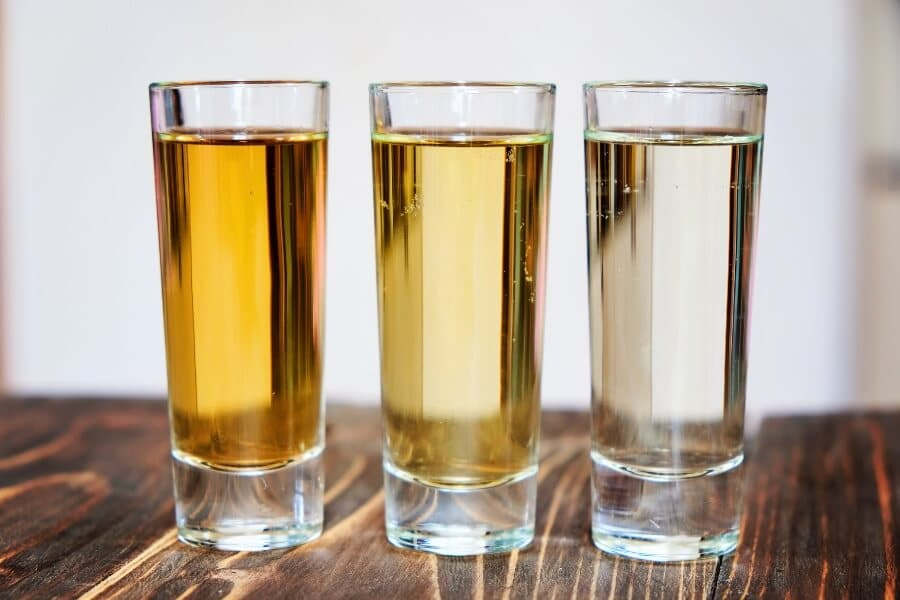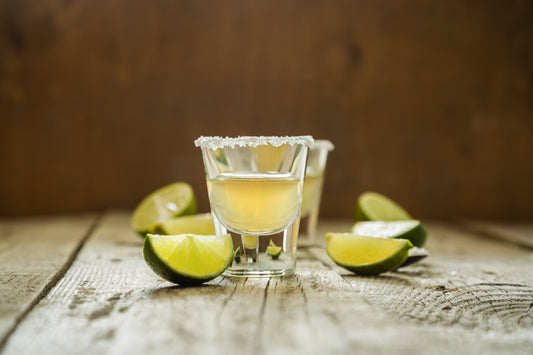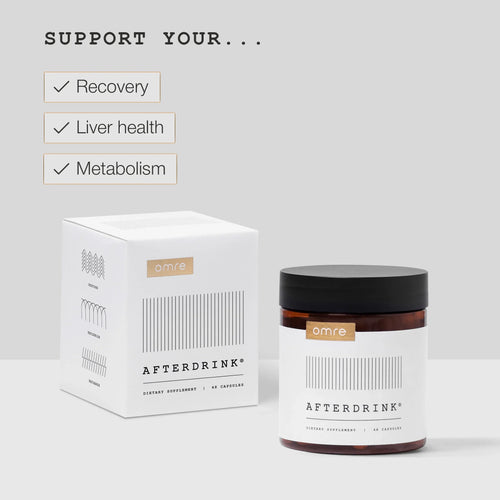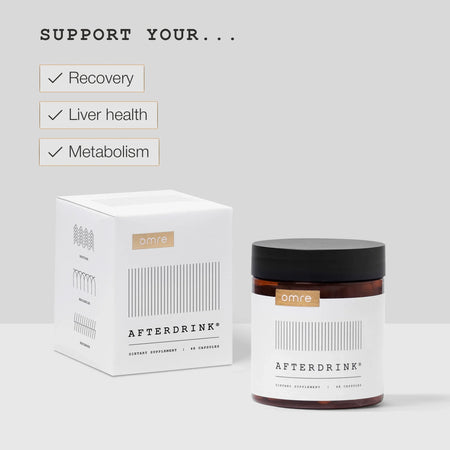Table of Contents
Tequila hangovers are a funny beast. Sometimes, they can be the worst ever and in some cases not so bad at all.
You may have even heard some people say there are Tequilas that give no hangovers.
So, what’s the deal with Tequila hangovers, why are some worse than others and how do you get rid of them. That’s exactly what we’re going to take a closer look at today.
In this article, we aim to clear up some of the confusion around Tequila and hangovers. To do so, we’ll first go over the causes of a Tequila hangover before exploring why some Tequila hangovers are different.
We’ll then give a more detailed answer as to whether a “no hangover” Tequila exists or not.
AFTERDRINK®
A supercharged antioxidant designed to support recovery, made from the very best, research-backed ingredients on the market.*
Tequila hangover causes
Before we can get into why some Tequila hangovers are worse than others, we first need to go over how Tequila causes hangovers.
In simple terms, hangovers are caused by drinking too much alcohol, too quickly. Regardless of whether it’s Tequila or any other liquor. And there are a few different reasons why you wake up with a hangover:
1) Dehydration:
You probably know that drinking too much alcohol causes dehydration. That’s because it blocks a hormone called ADH from being released from your pituitary gland (in the brain).
This hormone is responsible for making your kidneys hold onto water. Therefore, blocking its release means your kidneys flush out extra fluid which consequently leads to dehydration.
2) Inflammation:
“Inflammation” is another major cause of hangovers. When alcohol is metabolized (broken down) in your liver, toxic by-products are formed such as acetaldehyde.
These by-products are highly reactive and wreak havoc on your insides. That’s why in normal circumstances, your liver quickly breaks them down further into harmless compounds.
However, during periods of overindulgence, this system is overrun. To put it simply, this leads to a build-up of acetaldehyde and other such by-products that react with your cells causing inflammation.(1)
3) Congeners:
Congeners are the name given to compounds in alcoholic drinks that give them distinctive taste and aromas. They are formed during the fermentation process that produces alcohol, as well as when alcohol is aged in barrels.
That means, drinks like red wine and whiskey have much higher amounts of congeners than gin or vodka. In fact, liquors like vodka are distilled and filtered to remove congeners.
The problem is that congeners make hangovers a lot worse because they are “biologically active”. This means that they, like acetaldehyde mentioned above, also react with your cells causing inflammation.
And studies have shown that drinks with higher congener concentrations give worse hangovers. This factor is important when understanding why some Tequila hangovers are worse than others which we will cover later on.(2)
4) Reduced sleep quality:
Alcohol blocks your brain from reaching the rapid eye movement (REM) stage of sleep. This is essential for feeling fully rested. That’s why sleeping eight hours after a few drinks never feels the same as if you’d slept with no alcohol in your system.
In summary: Tequila hangovers are caused by many different factors. All of which play a part in hangover symptoms.
Symptoms of a Tequila hangover
Tequila hangover symptoms are no different from any other hangover. In some cases, the symptoms might be more intense. But the general undertones are the same and include:
- Nausea and vomiting
- Headache
- Anxiety
- Body pain / Muscle aches
- Inability to concentrate
Do different types of Tequila cause different hangovers?
There are a lot of myths when it comes to Tequila and hangovers. Some people believe that certain types of Tequila give less severe hangovers. Whereas others believe that some Tequila gives no hangovers.
And there may be good reasons why this is.
But before we get into this, we first need to know what the different types of Tequila are.
Tequila is broadly categorized into three types.

1) Silver or Blanco Tequilas
Tequila at its most basic is often called a “Blanco” or silver Tequila. It’s usually bottled immediately after its final distillation. Typically, Blanco or silver Tequilas are clear in color.
They are most typically made solely from the blue agave plant and because they are the most basic form, they are also the least expensive of Tequilas. That means it makes them ideal for mixed drinks, such as margaritas.
2) Reposado Tequilas
Reposado literally translates to mean “restful”, or in this case, rested. And that is exactly the difference between Reposado and Blanco Tequilas, it’s been aged.
This tequila has been aged for at least two months, but can be up to a full year. This allows the flavor to mellow, taking on hints of oak, and turns the Tequila to a soft golden color.
3) Añejo Tequilas
Añejo Tequilas are aged for one to three years in oak barrels which is why they are known to have complex flavors. Añejo is considered a premium “sipping” Tequila.
So, when it comes to hangovers, which type of Tequila is the best?
It all comes down to the congener content we mentioned earlier. Drinks that are darker in color and have been aged will naturally contain more congeners.
That means Blanco Tequila should, in theory, give less of a hangover than Añejo Tequilas.
With that said, it obviously depends on how much of each you drink! Blanco Tequila can still give you the mother of all hangovers if you drink enough of it.
Does tequila give you a hangover?
Yes, tequila can cause a hangover if consumed in excessive amounts. The severity of a hangover depends on the quantity consumed, the tequila's quality, and individual factors like hydration and tolerance. Blanco tequila, with lower congeners, may cause milder hangovers compared to darker or mixed alcohols.
Tequila with no hangover: does it exist?
Whether it's Blanco, 100% agave, patron, or George Clooney’s Tequila, every single type can give you a hangover.
So that means, a no Tequila hangover does not exist!
And you should be suspicious if anyone tries to convince you otherwise.
That’s because, at the end of the day, the main hangover causing agent in all Tequila is ethanol (alcohol). Some Tequilas may have more congeners than others and, therefore, give slightly different intensity hangovers.
Unfortunately, a no “hangover Tequila” doesn't exist. If you drink enough of any type of Tequila, even the purest Blanco you can find, you’re guaranteed to wake up with a nasty hangover.
Drinking excessive amounts of tequila can lead to serious health risks beyond just your typical hangover. It’s important that you know and are able to recognize the signs of alcohol poisoning, such as confusion, vomiting, seizures, slow breathing, and hypothermia. Seek immediate medical attention if you experience any of these symptoms.
How long does a Tequila hangover last?
A tequila hangover typically lasts from a few hours to a full day, depending on factors like your personal sensitivity, how much tequila you drank, and your overall health. For some, hangovers can extend into a second day.
How long a Tequila hangover lasts depends entirely on your personal circumstances and sensitivity to hangovers. Everyone is different and some people don’t even get hangovers.
In addition, how much alcohol you drank plays a big part. In most cases, hangover symptoms last anywhere from a few hours to a whole day. For some of us, two-day hangovers are the norm.
The same goes for how much Tequila it takes to give you a hangover. Everyone is different and will experience different hangovers from varying amounts of alcohol. Find out how tequila hangovers compare to whiskey hangovers and wine hangovers.
To limit the effects of a hangover, stay hydrated before, during, and after drinking to minimize your chances of becoming dehydrated. The only way to prevent a tequila hangover is to avoid tequila altogether.
AFTERDRINK®
A supercharged antioxidant designed to support recovery, made from the very best, research-backed ingredients on the market.*
Is tequila better for hangovers?
Tequila, particularly 100% agave Blanco tequila, may be better for hangovers compared to other alcohols due to its lower congener content. Congeners are chemicals formed during fermentation that can worsen hangovers. However, consuming excessive tequila can still result in a hangover, as the total alcohol intake is the primary factor.
How to get rid of a Tequila hangover
So, you’ve had a few too many shots last night and have woken up with a Tequila hangover. What now?
By this stage, there are really only a few things that will help. These include:
– Drink lots of water to rehydrate. Rehydration salts can help you rehydrate faster.
– Sipping on some ginger tea if you’re feeling nauseous
– Painkillers like Tylenol
– Nutritious foods that are easy to digest and high in energy
– Certain vitamins like Vitamin B Complex
– Sleep and rest
And on that note, there are a couple of things you’ll want to avoid so you don’t make matters worse:
– avoid intense exercise
– Drinking caffeine when hungover can make you feel more jittery and on edge.
Anything else to consider?
Tequila hangovers are a sign from your body that you’ve had too much alcohol for your body to handle. The best way to “cure” a Tequila hangover is by preventing it from happening in the first place.
Choosing Tequila made from 100% pure agave can minimize hangover symptoms compared to mixto tequilas, which contain other sugars and additives. A sugar crash can worsen your hangover symptoms, so always opt for low-sugar mixers.
Having tequila-based cocktails shouldn’t be a problem if drinking within your limits. However, shots of Tequila are never a good idea if you’re planning to avoid a hangover. That’s because shots of any spirit will cause your blood alcohol concentrations to rise rapidly.
Eating a meal before going out and having a glass of water between each tequila-based drink will also go a long way in preventing the worst hangovers.
Tequila hangovers – Final words
That brings us to the end of our look into Tequila hangovers.
We’ve walked you through all the basic things you need to know, including why some types of Tequila may give you worse hangovers than others.
On that note, a “no hangover Tequila” does not exist because all types of alcohol will give you a hangover if you drink enough.
If you’re interested in ways to support your body in reducing hangover symptoms, check out our article on how to prepare for a night of drinking.





